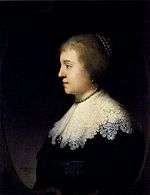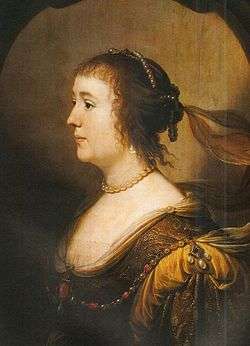Amalia of Solms-Braunfels
| Amalia of Solms-Braunfels | |
|---|---|
|
Amalia of Solms-Braunfels, portrait by Gerrit van Honthorst | |
| Princess consort of Orange | |
| Tenure | 1625-1647 |
| Born |
31 August 1602 Braunfels Castle in Braunfels |
| Died |
8 September 1675 (aged 73) the Hague |
| Spouse | Frederick Henry, Prince of Orange |
| Issue |
William II, Prince of Orange Louise Henriette, Duchess of Prussia Henriette Amalia of Nassau Elisabeth of Nassau Isabella Charlotte of Nassau Albertine Agnes, Countess of Nassau-Dietz Henriette Catherine, Princess of Anhalt-Dessau Henry Louis of Nassau Maria, Countess Palatine of Simmern-Kaiserslautern |
| Father | John Albert I, Count of Solms-Braunfels |
| Mother | Countess Agnes of Sayn-Wittgenstein |
Amalia of Solms-Braunfels (31 August 1602, Braunfels – 8 September 1675, The Hague), was a regent of Orange-Nassau. She was the wife of Frederick Henry, Prince of Orange, and the daughter of count John Albert I of Solms-Braunfels and countess Agnes of Sayn-Wittgenstein.
Biography
Early years: Amalia of Solms-Braunfels, born into the House of Solms, a ruling family with Imperial immediacy, spent her childhood at the parental castle at Braunfels. She became part of the train of Elizabeth, wife of Frederick V, Elector Palatine, the "Winter King" of Bohemia. After imperial forces defeated Frederick V, she fled from Prague with the pregnant queen to the west. Shelter was denied to them along the way because the emperor forbade it as Frederick had been placed under an Imperial ban. Elizabeth went into labour during their flight and Amalia helped her with her delivery of Prince Maurice at Küstrin castle
The end of their journey was The Hague, where stadtholder Maurice of Nassau, uncle of the elector gave them asylum in 1621. They often appeared at his court, where Maurice's younger half-brother Frederick Henry became infatuated with Amalia in 1622. She refused to become his lover and held out for marriage.
Marriage and Children
When Maurice of Nassau died, he made his half-brother Frederick Henry promise to wed. Frederick married Amalia on 4 April 1625.
Their marriage produced five children who lived to adulthood, and four who died young:

- Stadtholder William II (1626–1650), married Mary of England
- Luise Henriette of Nassau (1627–1667), married Frederick William, Elector of Brandenburg
- Henriette Amalia of Nassau (1628)
- Elisabeth of Nassau (1630)
- Isabella Charlotte of Nassau (1632–1642)
- Albertine Agnes of Nassau (1634–1696), married William Frederick, Count of Nassau-Dietz
- Henriette Catherine of Nassau (1637–1708), married John George II, Prince of Anhalt-Dessau
- Henry Louis of Nassau (1639)
- Maria of Nassau (1642–1688), married Louis Henry Maurice, son of Louis Philip of Palatine-Simmern-Kaiserslautern
Wife to the Stadtholder
When Frederick Henry became stadtholder after the death of his half-brother Prince Maurice, his influence grew substantially, as did Amalia's. Together Frederick Henry and Amalia succeeded in expanding court life in The Hague. They had several palaces built, including Huis ten Bosch. Amalia was a great collector of art and amassed many jewels, which were inherited by her four surviving daughters. She was described as intelligent, arrogant and ambitious, not beautiful but with a fresh and appealing appearance.

Amalia was the prime mover of several royal marriages, including that of her son William II to Mary, Princess Royal of England and Scotland (daughter of King Charles I of England) and of their daughters with several German princes.
She had a large influence upon policy; she acted as the political advisor of Frederick, and after he became sick in 1640, she openly participated in politics and received foreign diplomats. Her influence is regarded to have contributed to the Peace of Westphalia in 1648. As a recognition, King Philip IV of Spain granted her the area around Turnhout in 1649.
Regency
After the death of her son William II in 1650 she became the main guardian of her grandson William III (Prince William III of Orange and later also King William III of England). She kept this position until 1672.
Ancestry
| Ancestors of Amalia of Solms-Braunfels | ||||||||||||||||||||||||||||||||||||||||||||||||||||||||||||||||||||||||||||||||||||||||||||||||||||||||||||||||||||||||||||||||||||||||||||||||||||||||||||||||||||||||||||||||||||||||||||||||||||||||||||||||||||||||||||||||||||||||||||||||||||||||||||||||||||||||||||||||||||||||||||||||||||||||||||||||||||||||||||||||||||||||||||||||||||||||||||||||||||||||||||||||||||||||||||||||||||||||||||||||||||||||||||||||||||||||||||||||||||||||||||||||||||||||||||||||||||||||||||||||||||||||||||||||||||||||||||||||||
|---|---|---|---|---|---|---|---|---|---|---|---|---|---|---|---|---|---|---|---|---|---|---|---|---|---|---|---|---|---|---|---|---|---|---|---|---|---|---|---|---|---|---|---|---|---|---|---|---|---|---|---|---|---|---|---|---|---|---|---|---|---|---|---|---|---|---|---|---|---|---|---|---|---|---|---|---|---|---|---|---|---|---|---|---|---|---|---|---|---|---|---|---|---|---|---|---|---|---|---|---|---|---|---|---|---|---|---|---|---|---|---|---|---|---|---|---|---|---|---|---|---|---|---|---|---|---|---|---|---|---|---|---|---|---|---|---|---|---|---|---|---|---|---|---|---|---|---|---|---|---|---|---|---|---|---|---|---|---|---|---|---|---|---|---|---|---|---|---|---|---|---|---|---|---|---|---|---|---|---|---|---|---|---|---|---|---|---|---|---|---|---|---|---|---|---|---|---|---|---|---|---|---|---|---|---|---|---|---|---|---|---|---|---|---|---|---|---|---|---|---|---|---|---|---|---|---|---|---|---|---|---|---|---|---|---|---|---|---|---|---|---|---|---|---|---|---|---|---|---|---|---|---|---|---|---|---|---|---|---|---|---|---|---|---|---|---|---|---|---|---|---|---|---|---|---|---|---|---|---|---|---|---|---|---|---|---|---|---|---|---|---|---|---|---|---|---|---|---|---|---|---|---|---|---|---|---|---|---|---|---|---|---|---|---|---|---|---|---|---|---|---|---|---|---|---|---|---|---|---|---|---|---|---|---|---|---|---|---|---|---|---|---|---|---|---|---|---|---|---|---|---|---|---|---|---|---|---|---|---|---|---|---|---|---|---|---|---|---|---|---|---|---|---|---|---|---|---|---|---|---|---|---|---|---|---|---|---|---|---|---|---|---|---|---|---|---|---|---|---|---|---|---|---|---|---|---|---|---|---|---|---|---|---|---|---|---|---|---|---|---|---|---|---|---|---|---|---|---|---|---|---|---|---|---|---|---|---|---|---|---|---|---|---|---|---|---|---|---|---|---|---|---|---|---|---|---|---|---|---|---|---|---|---|---|---|---|---|---|---|---|---|---|---|---|---|---|---|---|---|---|---|---|---|---|---|---|---|---|---|---|---|---|---|---|---|---|---|---|---|---|---|---|---|---|---|---|---|---|---|---|---|---|---|---|
| ||||||||||||||||||||||||||||||||||||||||||||||||||||||||||||||||||||||||||||||||||||||||||||||||||||||||||||||||||||||||||||||||||||||||||||||||||||||||||||||||||||||||||||||||||||||||||||||||||||||||||||||||||||||||||||||||||||||||||||||||||||||||||||||||||||||||||||||||||||||||||||||||||||||||||||||||||||||||||||||||||||||||||||||||||||||||||||||||||||||||||||||||||||||||||||||||||||||||||||||||||||||||||||||||||||||||||||||||||||||||||||||||||||||||||||||||||||||||||||||||||||||||||||||||||||||||||||||||||
References
External links
| Wikimedia Commons has media related to Amalia of Solms-Braunfels. |
